Apple's worldwide share of PC market now 3.2 percent - report
Record-setting shipments of more than 2 million Mac systems during Apple Inc.'s fourth fiscal quarter of 2007 has pushed its share of the worldwide PC market ahead another 200 basis points to 3.2 percent, according to investment bank Piper Jaffray.
"Apple shipped 2.16 million Macs in the September quarter [and] IDC estimates that 66.85 million PCs were shipped worldwide in the September quarter," analyst Gene Munster wrote in a research note to clients Tuesday. "Therefore, Apple's market share rose to 3.2 percent."
The Cupertino-based firm's slice of the global computer market has risen from 2.5 percent in March — just six months ago — helped by strength in its notebook systems and the recent introduction of redesigned all-in-one iMacs.
Munster told clients that he expects the trend of Mac market share growth will continue due to a combination of factors presently coming together, including the iPod and iPhone halo effect, a new operating system, a strong direct sales channel, and a strong brand awareness among others.
"Mac market share is at a historic high, and on October 26 Apple will release a new version of its operating system, Mac OS X Leopard," he wrote. "In itself, we believe Leopard's sales performance will be similar to that of Tiger; adjusted for the larger Mac OS X user base of approximately 23 million, we expect Leopard to add approximately $240 million [in revenues] to the December quarter."
But more importantly, Munster said, he believes Mac OS X is a meaningful factor in the decision to buy a Mac. As such, he sees the software helping Apple continue to increase its share gains at a measured pace over the next several years.
AT&T rev share payments
Meanwhile, the Piper Jaffray analyst also used his research note Tuesday to delve further in to the mystery surrounding the percent of service revenues from iPhone customers that AT&T is sharing with Apple under the pair's exclusive carrier agreement.
Apple said Monday that its "iPhone and Related Products And Services" totaled $118 million for its fiscal fourth quarter, a large portion of which is believed to be the company's share of the service fees from AT&T.
"We believe this equates to $18/sub/month factoring in Apple's estimate of approximately 250,000 iPhones that were sold to be unlocked to operate on a carrier other than AT&T (unlocked iPhones do not contribute to the revenue sharing totals," Munster explained.
Fiscal Q1 2008 guidance
The analyst also told clients that he was surprised by Apple's guidance for its current December quarter — its first fiscal quarter of 2008 — which was significantly above Wall Street's consensus estimates at per-share earnings of $1.42 on sales of $9.2 billion.
"With Apple becoming notorious for providing overly conservative guidance, the biggest surprise of the quarter may be that the December quarter outlook was ahead of Street consensus," he wrote. "Apple's product lineup for this holiday season is undoubtedly its strongest ever and we believe this will allow the company to achieve and likely exceed expectations."
Apple has typically beat its own guidance by an average of 9 percent over the past 11 quarters, the analyst explained, but said that scenario seems unlikely for the December quarter.
Munster maintained his "Outperform" rating on shares of Apple, raising his price target once again from $211 to $222.
 Katie Marsal
Katie Marsal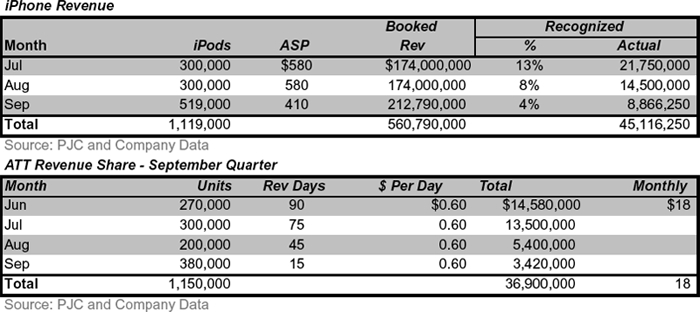
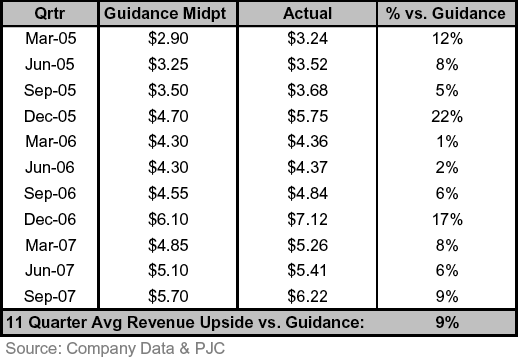


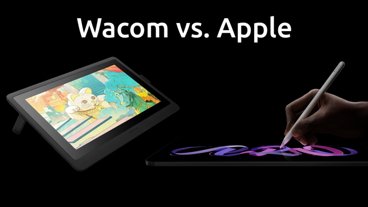
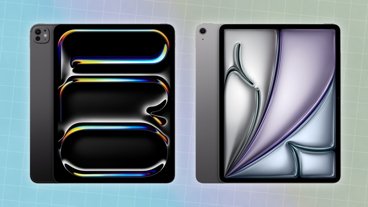
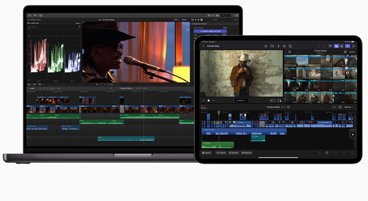
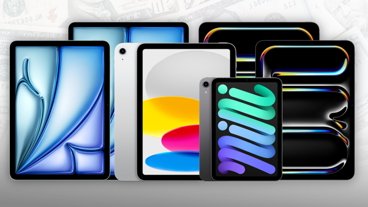







 Malcolm Owen
Malcolm Owen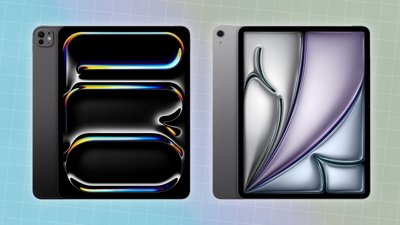
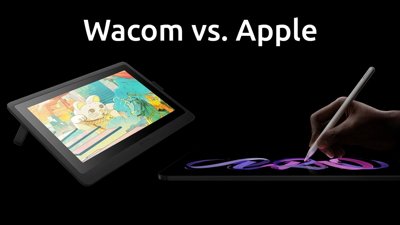
 Amber Neely
Amber Neely

 Marko Zivkovic
Marko Zivkovic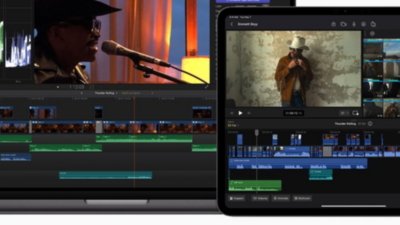
 David Schloss
David Schloss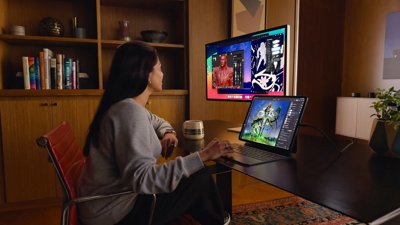
 Wesley Hilliard
Wesley Hilliard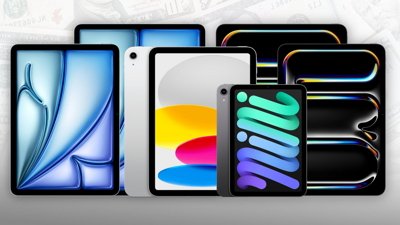
 Mike Wuerthele and Malcolm Owen
Mike Wuerthele and Malcolm Owen
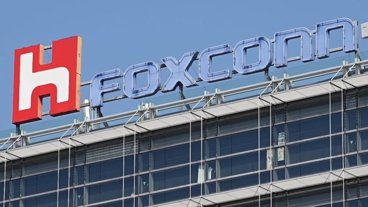








25 Comments
Actually, Apple's worldwide Mac market share should be %100 unless someone else out there is making Macs.
Actually, Apple's worldwide Mac market share should be %100 unless someone else out there is making Macs.
Rats you beat me to it, exactly my comment....
While I agree the Mac shouldn't be considered like a dumbed-down PC...it's still being treated as a PC in market share figures.

But while it *is* being treated as a PC, the worldwide market share figures give people little information about anything. The commodity PC is spreading to developing countries rapidly. These bargain-bin PCs are becoming affordable to new classes of people in these countries. These people, however, will probably not be able to afford the software to go with the computer they've bought...nor would they have to buy it since these countries normally openly pirate software.
If software developers go with the worldwide market share numbers to decide whether it's viable to develop for Mac, they're targeting a large chunk of people in the 'Under 2000' and '2000-9999' category who would never buy software in the first place (they would use the software that comes with Windows and possibly pirate everything else). The recent PC growth is not representative of potential sales since most households in North America and in parts of Europe already have a computer. The growth is attributed to developing country populations that can now barely afford a computer.
Software developers, game companies, and analysts should be able to catch on that North Americans, Europeans and Australians are the ones that will be forking over the dough for software. In this category of people, Apple is doing surprisingly well.
Let's hypothesize that one day Apple reaches 50% market share (a gross exaggeration obviously) in North America and Europe but that worldwide market share remains a low 7.5% because cheap PCs have flooded Asian and South American countries and, overall, the number of Macs out there is still quite small. Would it make sense to solely target software at PC users? If developers don't mind selling their software at lower prices in those countries or if they outright don't care that their software gets stolen, perhaps. But rationally, it makes more sense to target the population that will pay for the software. And in this example, that population is made up of an equal amount of Mac and PC users.
So when analysts and doomsayers mention worldwide market share figures, one has to wonder what they're really trying to convey. Because the number doesn't mean a whole lot.
So, today is the day Apple's Market cap blasted past Intel AND IBM!!Not sure how long they can sustain a P/E of 52+, but what the heck!Anyone want to take bets on when Apple's cap will pass M$'s?!
While I agree the Mac shouldn't be considered like a dumbed-down PC...it's still being treated as a PC in market share figures.
But while it *is* being treated as a PC, the worldwide market share figures give people little information about anything. The commodity PC is spreading to developing countries rapidly. These bargain-bin PCs are becoming affordable to new classes of people in these countries. These people, however, will probably not be able to afford the software to go with the computer they've bought...nor would they have to buy it since these countries normally openly pirate software.
If software developers go with the worldwide market share numbers to decide whether it's viable to develop for Mac, they're targeting a large chunk of people in the 'Under 2000' and '2000-9999' category who would never buy software in the first place (they would use the software that comes with Windows and possibly pirate everything else). The recent PC growth is not representative of potential sales since most households in North America and in parts of Europe already have a computer. The growth is attributed to developing country populations that can now barely afford a computer.
Software developers, game companies, and analysts should be able to catch on that North Americans, Europeans and Australians are the ones that will be forking over the dough for software. In this category of people, Apple is doing surprisingly well.
Let's hypothesize that one day Apple reaches 50% market share (a gross exaggeration obviously) in North America and Europe but that worldwide market share remains a low 7.5% because cheap PCs have flooded Asian and South American countries and, overall, the number of Macs out there is still quite small. Would it make sense to solely target software at PC users? If developers don't mind selling their software at lower prices in those countries or if they outright don't care that their software gets stolen, perhaps. But rationally, it makes more sense to target the population that will pay for the software. And in this example, that population is made up of an equal amount of Mac and PC users.
So when analysts and doomsayers mention worldwide market share figures, one has to wonder what they're really trying to convey. Because the number doesn't mean a whole lot.
Those are good points that I try to make as well. Linux people also try to make their own marketshare seem much more than the estimated under 1% it actually commands.
They use machines sold in China and other 3rd world marketsas examples, where the machines are usually sold with Linux, but are soon stripped of it for the Windows and Office suites they bought right outside of the computer store from a guy who sells them the DVD for $2.